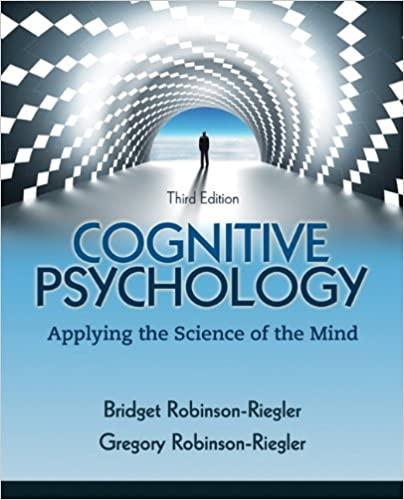Question
make a short response in regards to this text For the average person, waking up in the morning starts with a loud sound of an
make a short response in regards to this text "For the average person, waking up in the morning starts with a loud sound of an alarm clock on their bedside table. This all begins with the sound of the alarm being a neutral stimulus, this means it doesn't initially bring out any responses at first, but overtime it further becomes conditioned when commanded with an unconditioned stimulus. This is also known as a learned response (Jiyani, A. 2023). Overtime, the sound of an alarm clock going off in the morning or after an evening nap, becomes a known factor of the act of waking up. This repeated pairing of the two stimulates can even result in waking up before an alarm clock. This can become aware of someone's daily life.
Classical conditioning is a type of learning that happens within a repeated association of up to more than 2 different stimuli. This type of conditioning leads to an automatic response when a stimulus affiliates with another stimulus that regularly would not associate with the response (Stangor, C., & Walinga, J. n.d.).
The sound from the alarm clock is an example of classical conditioning since the sound pairing with the task of waking up in the morning is associated with the specific response through repeated pairings every time a human wakes up.
Ivan Pavlov, a famous experimentator who conducted labs with dogs showed how a ringing of a bell was the neutral stimulus, and was paired with an unconditional stimulus; food further showed a response of salvation (Schweitzer, K. 2019). This experiment ran by Pavlov was the starting point of understandment how associations with stimuli further lead to automatic responses for someone.
In the context of classical conditioning when it comes to the relation of Dr. Pitts lectures, the examples of alarm clocks accomanys to how a neutral stimulus (NS) can become conditioned though the path of an Unconditioned stimulus that promotes a conditioned response (G. Pitt, 2023)
Waking up is one of the hardest parts of my day. I took interest in the classical conditioning of an alarm clock because I can relate to the use of it and wanted to become educated on the topic. The struggle of getting myself out of bed in the morning is a very relatable part of my lifestyle, this was a big factor that drove me to explore more ways to make this process a bit more maintained. Understanding classical conditioning and the relation to alarm clocks gave me more insight for the psychology and the act of waking up. This can potentially make the process of starting my day a lot more attainable in the long run."
Step by Step Solution
There are 3 Steps involved in it
Step: 1

Get Instant Access to Expert-Tailored Solutions
See step-by-step solutions with expert insights and AI powered tools for academic success
Step: 2

Step: 3

Ace Your Homework with AI
Get the answers you need in no time with our AI-driven, step-by-step assistance
Get Started


